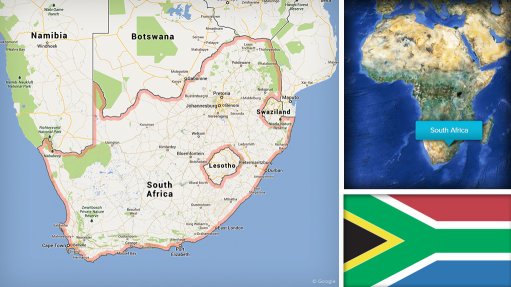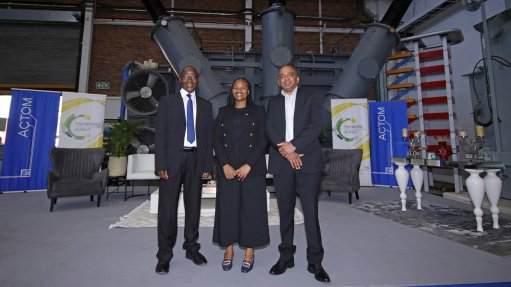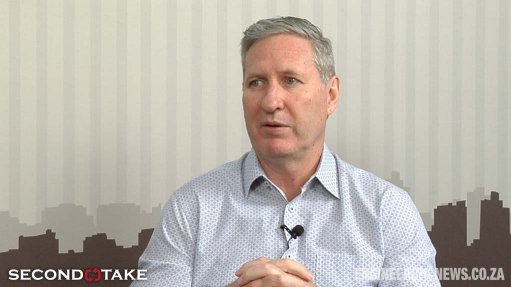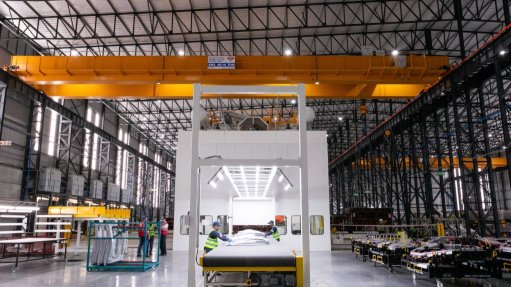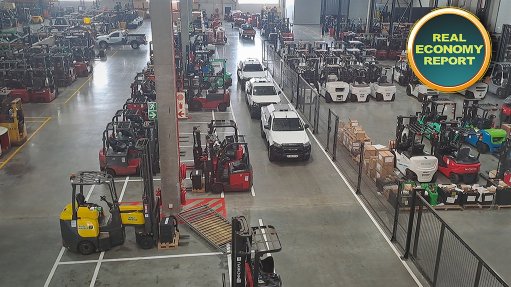Sars collects R1.86tr during year to end March
Tax authority the South African Revenue Service (Sars) collected a net amount of R1.86-trillion during the fiscal year to end March 2025, which is R8.8-billion higher than the revised estimate, and R114-billion more than the prior year’s R1.74-trillion.
A record gross amount of R2.3-trillion was collected, representing year-on-year growth of 6.9% against estimated nominal GDP growth of 5.4% for the fiscal year.
Sars paid refunds of R447.7-billion to taxpayers, which is the highest-ever amount paid in refunds, up from R413.9-billion in the 2023/24 fiscal year, representing growth of 8.2%, Sars commissioner Edward Kieswetter said while presenting the preliminary revenue-collection outcome figures.
The preliminary revenue collection represents a substantial tax-to-GDP ratio of 24.8%, reflecting the country’s fiscal health and efficiency in revenue generation.
Further, the tax-buoyancy ratio for the fiscal year 2024/25 was estimated at 1.2, indicating the robust response of tax revenue relative to economic growth.
This buoyancy ratio underscores the capacity to adapt revenue collection strategies to the dynamic economic environment, thereby ensuring sustained fiscal stability and growth, he said.
Net Personal Income Tax (PIT), including interest, grew by R81.8-billion, or 12.6%, which could be partly attributed to above-inflation growth in the finance and community sectors’ pay-as-you-earn (PAYE), as well as the gains from two-pot pension withdrawals.
The two-pot directives were valued at R12.9-billion for the year-to-date, compared with the projected estimate of R5-billion, he noted.
Additionally, there has been a noticeable improvement in PAYE tax compliance, as indicated by the voluntary compliance index, which rose by 0.38 percentage points to 75.48% from the prior year’s 75.1%. This uptick in compliance efforts is shaping taxpayer behaviour, he added.
Further, Net Company Income Tax (CIT), including interest, grew by R6.5-billion, or 2.1%, driven by CIT Provisional Tax collections of R323.3-billion, which were R10.5-billion, or 3.3%, higher than in the prior year, and exceeded the Budget 2025 estimate by R4.3 billion, or 1.4%.
The growth was mainly owing to the finance sector, which was buoyed by improved profits, whereas the mining sector continued to contract, Kieswetter said.
The CIT voluntary compliance index rose by 3.2 percentage points to 51.66% from the prior year’s 48.43%, with notable improvements in filing compliance.
Net Value-Added Tax (VAT), which contributed 24.7% of total collections, grew by R10.5-billion, or 2.3%.
At the end of March, VAT refunds amounting to R365.5-billion were disbursed, with year-on-year growth of R22.5-billion, or 6.6%. The top three refunded sectors were mining - mainly owing to higher exports and local expenses, finance and manufacturing.
Total VAT refunds this year of R365.5-billion represent about 4.9% of GDP. It is pleasing that of all the refunds, R127.4-billion were directed to small, medium-sized and microenterprises, which are pivotal in driving job creation, he emphasised.
Meanwhile, preliminary indications are that Sars’ efforts avoided leakage worth R74-billion, up from R60.7-billion avoided in 2023/24, predominantly owing to syndicated-crimes investigation, investigative audit and tax verifications.
Domestic VAT collections amounted to R562.1-billion, growing by R36.6-billion, or 7%. Of this, R271-billion, or 48.2%, of the Domestic VAT was paid by large business vendors, and R292.1-billion, or 51.8%, by non-large business vendors, predominately from the finance sector.
This growth can be attributed to factors including improved consumer sentiment, lower interest rates, contained inflation, and early pension-fund withdrawals, all of which have bolstered household consumption in the final quarter of 2024.
Further, an additional R9.8-billion was collected as cash from the Sars Compliance Revenue efforts, the commissioner said.
The VAT voluntary compliance index rose by 1.8 percentage points to 65.58% from 63.78% in the 2023/24 fiscal year, signalling positive shifts in the in-year compliance trends.
Imports had contracted by 3.3% by March 31, resulting in lower-than-assumed Import VAT of R2.3-billion as measured against the Budget 2025 estimate. Import VAT collections contracted because of fewer imports of electrical machinery, as well as vehicles, parts and machinery.
“The broad rise in revenue can be attributed to enhanced strategies and the diligent implementation of compliance measures. Revenue growth demonstrates the efficacy of targeted efforts to optimise fiscal outcomes.
“These results underscore the importance of refining compliance operations to deliver sustainable financial growth and accountability. The achievement underscores Sars’ commitment to rigorous compliance and our ability to drive revenue-collection growth through strategic interventions,” said Kieswetter.
Specifically, Sars is leveraging technology, such as data science, AI and machine learning algorithms, to counter criminality and wilful non-compliance. These systems also ensure that no legitimate refunds are denied, while preventing impermissible and fraudulent refunds.
Sars is making steady progress in its strategic intent to build a tax and customs system that is based on voluntary compliance, while enhancing its capability to detect, deter and make wilful non-compliance difficult and costly.
“We must broaden our tax base to achieve our country's destiny and we must continue to encourage fiscal citizenship, while connecting people, data and technology to fulfil our mandate,” Kieswetter said.
“As we step into the 2025/26 fiscal year, our primary goal is strategically to harness the components of our balance sheet. Sars will continue to deepen its work with and through all stakeholders in the tax ecosystem to engender trust in the organisation.”
Tax payer behaviour and confidence gives Sars a sense of compliance. This is determined by the confidence tax payers have in Sars and government.
“The quality of the spend - and wastage and corruption detracts from that - the sense of benefit and value for money ultimately influence tax payer behaviour. If this confidence goes down, then actual revenue results will tend to go down, regardless of estimates.
“We are building deep institutional integrity in Sars and the work we select - which we frame as the compliance programme - and our capability to give effect to this determines the efficacy of Sars,” he said.
The confidence in Sars as shown by surveys of taxpayers reflects these efforts, with confidence in tax services at 87%, tax payer attitudes to compliance at 77%, public trust in Sars at 75% and employer engagement at 71%.
“We are pleased that the programme of rebuilding Sars is bearing fruit,” said Kieswetter.
Article Enquiry
Email Article
Save Article
Feedback
To advertise email advertising@creamermedia.co.za or click here
Comments
Announcements
What's On
Subscribe to improve your user experience...
Option 1 (equivalent of R125 a month):
Receive a weekly copy of Creamer Media's Engineering News & Mining Weekly magazine
(print copy for those in South Africa and e-magazine for those outside of South Africa)
Receive daily email newsletters
Access to full search results
Access archive of magazine back copies
Access to Projects in Progress
Access to ONE Research Report of your choice in PDF format
Option 2 (equivalent of R375 a month):
All benefits from Option 1
PLUS
Access to Creamer Media's Research Channel Africa for ALL Research Reports, in PDF format, on various industrial and mining sectors
including Electricity; Water; Energy Transition; Hydrogen; Roads, Rail and Ports; Coal; Gold; Platinum; Battery Metals; etc.
Already a subscriber?
Forgotten your password?
Receive weekly copy of Creamer Media's Engineering News & Mining Weekly magazine (print copy for those in South Africa and e-magazine for those outside of South Africa)
➕
Recieve daily email newsletters
➕
Access to full search results
➕
Access archive of magazine back copies
➕
Access to Projects in Progress
➕
Access to ONE Research Report of your choice in PDF format
RESEARCH CHANNEL AFRICA
R4500 (equivalent of R375 a month)
SUBSCRIBEAll benefits from Option 1
➕
Access to Creamer Media's Research Channel Africa for ALL Research Reports on various industrial and mining sectors, in PDF format, including on:
Electricity
➕
Water
➕
Energy Transition
➕
Hydrogen
➕
Roads, Rail and Ports
➕
Coal
➕
Gold
➕
Platinum
➕
Battery Metals
➕
etc.
Receive all benefits from Option 1 or Option 2 delivered to numerous people at your company
➕
Multiple User names and Passwords for simultaneous log-ins
➕
Intranet integration access to all in your organisation









